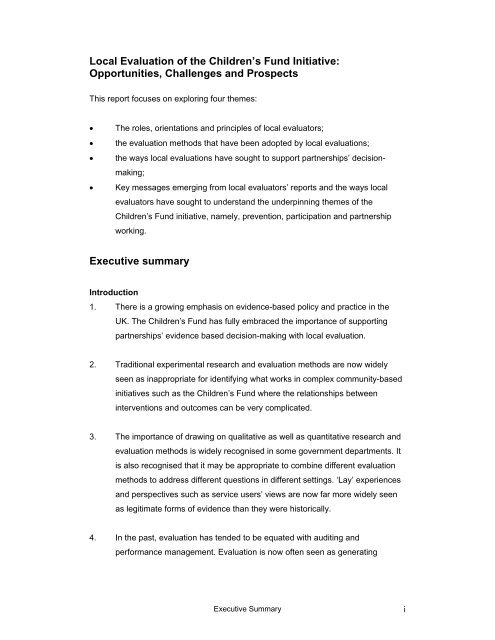Local Evaluation of Children's Services Learning from the Children's ...
Local Evaluation of Children's Services Learning from the Children's ...
Local Evaluation of Children's Services Learning from the Children's ...
- No tags were found...
Create successful ePaper yourself
Turn your PDF publications into a flip-book with our unique Google optimized e-Paper software.
<strong>Local</strong> <strong>Evaluation</strong> <strong>of</strong> <strong>the</strong> Children’s Fund Initiative:Opportunities, Challenges and ProspectsThis report focuses on exploring four <strong>the</strong>mes:• The roles, orientations and principles <strong>of</strong> local evaluators;• <strong>the</strong> evaluation methods that have been adopted by local evaluations;• <strong>the</strong> ways local evaluations have sought to support partnerships’ decisionmaking;• Key messages emerging <strong>from</strong> local evaluators’ reports and <strong>the</strong> ways localevaluators have sought to understand <strong>the</strong> underpinning <strong>the</strong>mes <strong>of</strong> <strong>the</strong>Children’s Fund initiative, namely, prevention, participation and partnershipworking.Executive summaryIntroduction1. There is a growing emphasis on evidence-based policy and practice in <strong>the</strong>UK. The Children’s Fund has fully embraced <strong>the</strong> importance <strong>of</strong> supportingpartnerships’ evidence based decision-making with local evaluation.2. Traditional experimental research and evaluation methods are now widelyseen as inappropriate for identifying what works in complex community-basedinitiatives such as <strong>the</strong> Children’s Fund where <strong>the</strong> relationships betweeninterventions and outcomes can be very complicated.3. The importance <strong>of</strong> drawing on qualitative as well as quantitative research andevaluation methods is widely recognised in some government departments. Itis also recognised that it may be appropriate to combine different evaluationmethods to address different questions in different settings. ‘Lay’ experiencesand perspectives such as service users’ views are now far more widely seenas legitimate forms <strong>of</strong> evidence than <strong>the</strong>y were historically.4. In <strong>the</strong> past, evaluation has tended to be equated with auditing andperformance management. <strong>Evaluation</strong> is now <strong>of</strong>ten seen as generatingExecutive Summaryi
















